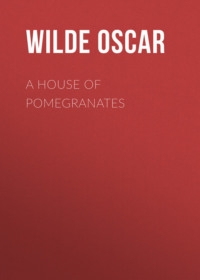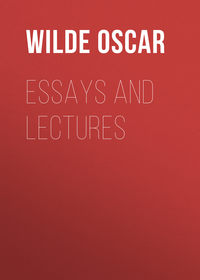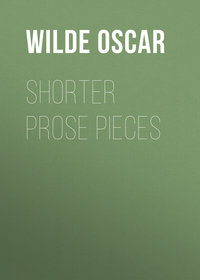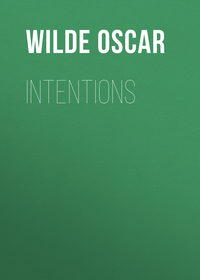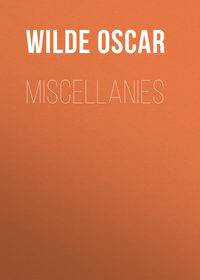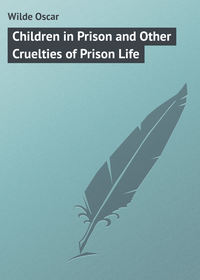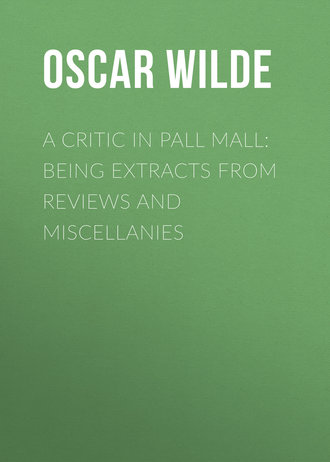 полная версия
полная версияA Critic in Pall Mall: Being Extracts from Reviews and Miscellanies
I know that there are many who consider that Shakespeare is more for the study than for the stage. With this view I do not for a moment agree. Shakespeare wrote the plays to be acted, and we have no right to alter the form which he himself selected for the full expression of his work. Indeed, many of the beauties of that work can be adequately conveyed to us only through the actor’s art. As I sat in the Town Hall of Oxford the other night, the majesty of the mighty lines of the play seemed to me to gain new music from the clear young voices that uttered them, and the ideal grandeur of the heroism to be made more real to the spectators by the chivalrous bearing, the noble gesture and the fine passion of its exponents. Even the dresses had their dramatic value. Their archæological accuracy gave us, immediately on the rise of the curtain, a perfect picture of the time. As the knights and nobles moved across the stage in the flowing robes of peace and in the burnished steel of battle, we needed no dreary chorus to tell us in what age or land the play’s action was passing, for the fifteenth century in all the dignity and grace of its apparel was living actually before us, and the delicate harmonies of colour struck from the first a dominant note of beauty which added to the intellectual realism of archæology the sensuous charm of art.
I have rarely seen a production better stage-managed. Indeed, I hope that the University will take some official notice of this delightful work of art. Why should not degrees be granted for good acting? Are they not given to those who misunderstand Plato and who mistranslate Aristotle? And should the artist be passed over? No. To Prince Hal, Hotspur and Falstaff, D.C.L.’s should be gracefully offered. I feel sure they would be gracefully accepted. To the rest of the company the crimson or the sheepskin hood might be assigned honoris causâ to the eternal confusion of the Philistine, and the rage of the industrious and the dull. Thus would Oxford confer honour on herself, and the artist be placed in his proper position. However, whether or not Convocation recognizes the claims of culture, I hope that the Oxford Dramatic Society will produce every summer for us some noble play like Henry IV. For, in plays of this kind, plays which deal with bygone times, there is always this peculiar charm, that they combine in one exquisite presentation the passions that are living with the picturesqueness that is dead. And when we have the modern spirit given to us in an antique form, the very remoteness of that form can be made a method of increased realism. This was Shakespeare’s own attitude towards the ancient world, this is the attitude we in this century should adopt towards his plays, and with a feeling akin to this it seemed to me that these brilliant young Oxonians were working. If it was so, their aim is the right one. For while we look to the dramatist to give romance to realism, we ask of the actor to give realism to romance.
A HANDBOOK TO MARRIAGE
(Pall Mall Gazette, November 18, 1885.)In spite of its somewhat alarming title this book may be highly recommended to every one. As for the authorities the author quotes, they are almost numberless, and range from Socrates down to Artemus Ward. He tells us of the wicked bachelor who spoke of marriage as ‘a very harmless amusement’ and advised a young friend of his to ‘marry early and marry often’; of Dr. Johnson who proposed that marriage should be arranged by the Lord Chancellor, without the parties concerned having any choice in the matter; of the Sussex labourer who asked, ‘Why should I give a woman half my victuals for cooking the other half?’ and of Lord Verulam who thought that unmarried men did the best public work. And, indeed, marriage is the one subject on which all women agree and all men disagree. Our author, however, is clearly of the same opinion as the Scotch lassie who, on her father warning her what a solemn thing it was to get married, answered, ‘I ken that, father, but it’s a great deal solemner to be single.’ He may be regarded as the champion of the married life. Indeed, he has a most interesting chapter on marriage-made men, and though he dissents, and we think rightly, from the view recently put forward by a lady or two on the Women’s Rights platform that Solomon owed all his wisdom to the number of his wives, still he appeals to Bismarck, John Stuart Mill, Mahommed, and Lord Beaconsfield, as instances of men whose success can be traced to the influence of the women they married. Archbishop Whately once defined woman as ‘a creature that does not reason and pokes the fire from the top,’ but since his day the higher education of women has considerably altered their position. Women have always had an emotional sympathy with those they love; Girton and Newnham have rendered intellectual sympathy also possible. In our day it is best for a man to be married, and men must give up the tyranny in married life which was once so dear to them, and which, we are afraid, lingers still, here and there.
‘Do you wish to be my wife, Mabel?’ said a little boy. ‘Yes,’ incautiously answered Mabel. ‘Then pull off my boots.’
On marriage vows our author has, too, very sensible views and very amusing stories. He tells of a nervous bridegroom who, confusing the baptismal and marriage ceremonies, replied when asked if he consented to take the bride for his wife: ‘I renounce them all’; of a Hampshire rustic who, when giving the ring, said solemnly to the bride: ‘With my body I thee wash up, and with all my hurdle goods I thee and thou’; of another who when asked whether he would take his partner to be his wedded wife, replied with shameful indecision: ‘Yes, I’m willin’; but I’d a sight rather have her sister’; and of a Scotch lady who, on the occasion of her daughter’s wedding, was asked by an old friend whether she might congratulate her on the event, and answered: ‘Yes, yes, upon the whole it is very satisfactory; it is true Jeannie hates her gudeman, but then there’s always a something!’ Indeed, the good stories contained in this book are quite endless and make it very pleasant reading, while the good advice is on all points admirable.
Most young married people nowadays start in life with a dreadful collection of ormolu inkstands covered with sham onyxes, or with a perfect museum of salt-cellars. We strongly recommend this book as one of the best of wedding presents. It is a complete handbook to an earthly Paradise, and its author may be regarded as the Murray of matrimony and the Baedeker of bliss.
How to be Happy though Married: Being a Handbook to Marriage. By a Graduate in the University of Matrimony. (T. Fisher Unwin.)
TO READ OR NOT TO READ
(Pall Mall Gazette, February 8, 1886.)Books, I fancy, may be conveniently divided into three classes:
1. Books to read, such as Cicero’s Letters, Suetonius, Vasari’s Lives of the Painters, the Autobiography of Benvenuto Cellini, Sir John Mandeville, Marco Polo, St. Simon’s Memoirs, Mommsen, and (till we get a better one) Grote’s History of Greece.
2. Books to re-read, such as Plato and Keats: in the sphere of poetry, the masters not the minstrels; in the sphere of philosophy, the seers not the savants.
3. Books not to read at all, such as Thomson’s Seasons, Rogers’s Italy, Paley’s Evidences, all the Fathers except St. Augustine, all John Stuart Mill except the essay on Liberty, all Voltaire’s plays without any exception, Butler’s Analogy, Grant’s Aristotle, Hume’s England, Lewes’s History of Philosophy, all argumentative books and all books that try to prove anything.
The third class is by far the most important. To tell people what to read is, as a rule, either useless or harmful; for, the appreciation of literature is a question of temperament not of teaching; to Parnassus there is no primer and nothing that one can learn is ever worth learning. But to tell people what not to read is a very different matter, and I venture to recommend it as a mission to the University Extension Scheme.
Indeed, it is one that is eminently needed in this age of ours, an age that reads so much, that it has no time to admire, and writes so much, that it has no time to think. Whoever will select out of the chaos of our modern curricula ‘The Worst Hundred Books,’ and publish a list of them, will confer on the rising generation a real and lasting benefit.
After expressing these views I suppose I should not offer any suggestions at all with regard to ‘The Best Hundred Books,’ but I hope you will allow me the pleasure of being inconsistent, as I am anxious to put in a claim for a book that has been strangely omitted by most of the excellent judges who have contributed to your columns. I mean the Greek Anthology. The beautiful poems contained in this collection seem to me to hold the same position with regard to Greek dramatic literature as do the delicate little figurines of Tanagra to the Phidian marbles, and to be quite as necessary for the complete understanding of the Greek spirit.
I am also amazed to find that Edgar Allan Poe has been passed over. Surely this marvellous lord of rhythmic expression deserves a place? If, in order to make room for him, it be necessary to elbow out some one else, I should elbow out Southey, and I think that Baudelaire might be most advantageously substituted for Keble.
No doubt, both in the Curse of Kehama and in the Christian Year there are poetic qualities of a certain kind, but absolute catholicity of taste is not without its dangers. It is only an auctioneer who should admire all schools of art.
THE LETTERS OF A GREAT WOMAN
(Pall Mall Gazette, March 6, 1886.)Of the many collections of letters that have appeared in this century few, if any, can rival for fascination of style and variety of incident the letters of George Sand which have recently been translated into English by M. Ledos de Beaufort. They extend over a space of more than sixty years, from 1812 to 1876, in fact, and comprise the first letters of Aurore Dupin, a child of eight years old, as well as the last letters of George Sand, a woman of seventy-two. The very early letters, those of the child and of the young married woman, possess, of course, merely a psychological interest; but from 1831, the date of Madame Dudevant’s separation from her husband and her first entry into Paris life, the interest becomes universal, and the literary and political history of France is mirrored in every page.
For George Sand was an indefatigable correspondent; she longs in one of her letters, it is true, for ‘a planet where reading and writing are absolutely unknown,’ but still she had a real pleasure in letter-writing. Her greatest delight was the communication of ideas, and she is always in the heart of the battle. She discusses pauperism with Louis Napoleon in his prison at Ham, and liberty with Armand Barbes in his dungeon at Vincennes; she writes to Lamennais on philosophy, to Mazzini on socialism, to Lamartine on democracy, and to Ledru-Rollin on justice. Her letters reveal to us not merely the life of a great novelist but the soul of a great woman, of a woman who was one with all the noblest movements of her day and whose sympathy with humanity was boundless absolutely. For the aristocracy of intellect she had always the deepest veneration, but the democracy of suffering touched her more. She preached the regeneration of mankind, not with the noisy ardour of the paid advocate, but with the enthusiasm of the true evangelist. Of all the artists of this century she was the most altruistic; she felt every one’s misfortunes except her own. Her faith never left her; to the end of her life, as she tells us, she was able to believe without illusions. But the people disappointed her a little. She saw that they followed persons not principles, and for ‘the great man theory’ George Sand had no respect. ‘Proper names are the enemies of principles’ is one of her aphorisms.
So from 1850 her letters are more distinctly literary. She discusses modern realism with Flaubert, and play-writing with Dumas fils; and protests with passionate vehemence against the doctrine of L’art pour l’art. ‘Art for the sake of itself is an idle sentence,’ she writes; ‘art for the sake of truth, for the sake of what is beautiful and good, that is the creed I seek.’ And in a delightful letter to M. Charles Poncy she repeats the same idea very charmingly. ‘People say that birds sing for the sake of singing, but I doubt it. They sing their loves and happiness, and in that they are in keeping with nature. But man must do something more, and poets only sing in order to move people and to make them think.’ She wanted M. Poncy to be the poet of the people and, if good advice were all that had been needed, he would certainly have been the Burns of the workshop. She drew out a delightful scheme for a volume to be called Songs of all Trades and saw the possibilities of making handicrafts poetic. Perhaps she valued good intentions in art a little too much, and she hardly understood that art for art’s sake is not meant to express the final cause of art but is merely a formula of creation; but, as she herself had scaled Parnassus, we must not quarrel at her bringing Proletarianism with her. For George Sand must be ranked among our poetic geniuses. She regarded the novel as still within the domain of poetry. Her heroes are not dead photographs; they are great possibilities. Modern novels are dissections; hers are dreams. ‘I make popular types,’ she writes, ‘such as I do no longer see, but such as they should and might be.’ For realism, in M. Zola’s acceptation of the word, she had no admiration. Art to her was a mirror that transfigured truths but did not represent realities. Hence she could not understand art without personality. ‘I am aware,’ she writes to Flaubert, ‘that you are opposed to the exposition of personal doctrine in literature. Are you right? Does not your opposition proceed rather from a want of conviction than from a principle of æsthetics? If we have any philosophy in our brain it must needs break forth in our writings. But you, as soon as you handle literature, you seem anxious, I know not why, to be another man, the one who must disappear, who annihilates himself and is no more. What a singular mania! What a deficient taste! The worth of our productions depends entirely on our own. Besides, if we withhold our own opinions respecting the personages we create, we naturally leave the reader in uncertainty as to the opinion he should himself form of them. That amounts to wishing not to be understood, and the result of this is that the reader gets weary of us and leaves us.’
She herself, however, may be said to have suffered from too dominant a personality, and this was the reason of the failure of most of her plays.
Of the drama in the sense of disinterested presentation she had no idea, and what is the strength and life-blood of her novels is the weakness of her dramatic works. But in the main she was right. Art without personality is impossible. And yet the aim of art is not to reveal personality, but to please. This she hardly recognized in her æsthetics, though she realized it in her work. On literary style she has some excellent remarks. She dislikes the extravagances of the romantic school and sees the beauty of simplicity. ‘Simplicity,’ she writes, ‘is the most difficult thing to secure in this world: it is the last limit of experience and the last effort of genius.’ She hated the slang and argot of Paris life, and loved the words used by the peasants in the provinces. ‘The provinces,’ she remarks, ‘preserve the tradition of the original tongue and create but few new words. I feel much respect for the language of the peasantry; in my estimation it is the more correct.’
She thought Flaubert too much preoccupied with the sense of form, and makes these excellent observations to him – perhaps her best piece of literary criticism. ‘You consider the form as the aim, whereas it is but the effect. Happy expressions are only the outcome of emotion and emotion itself proceeds from a conviction. We are only moved by that which we ardently believe in.’ Literary schools she distrusted. Individualism was to her the keystone of art as well as of life. ‘Do not belong to any school: do not imitate any model,’ is her advice. Yet she never encouraged eccentricity. ‘Be correct,’ she writes to Eugène Pelletan, ‘that is rarer than being eccentric, as the time goes. It is much more common to please by bad taste than to receive the cross of honour.’
On the whole, her literary advice is sound and healthy. She never shrieks and she never sneers. She is the incarnation of good sense. And the whole collection of her letters is a perfect treasure-house of suggestions both on art and on politics.
Letters of George Sand. Translated and edited by Raphael Ledos de Beaufort. (Ward and Downey.)
BÉRANGER IN ENGLAND
(Pall Mall Gazette, April 21, 1886.)A philosophic politician once remarked that the best possible form of government is an absolute monarchy tempered by street ballads.
Without at all agreeing with this aphorism we still cannot but regret that the new democracy does not use poetry as a means for the expression of political opinion. The Socialists, it is true, have been heard singing the later poems of Mr. William Morris, but the street ballad is really dead in England. The fact is that most modern poetry is so artificial in its form, so individual in its essence and so literary in its style, that the people as a body are little moved by it, and when they have grievances against the capitalist or the aristocrat they prefer strikes to sonnets and rioting to rondels.
Possibly, Mr. William Toynbee’s pleasant little volume of translations from Béranger may be the herald of a new school. Béranger had all the qualifications for a popular poet. He wrote to be sung more than to be read; he preferred the Pont Neuf to Parnassus; he was patriotic as well as romantic, and humorous as well as humane. Translations of poetry as a rule are merely misrepresentations, but the muse of Béranger is so simple and naïve that she can wear our English dress with ease and grace, and Mr. Toynbee has kept much of the mirth and music of the original. Here and there, undoubtedly, the translation could be improved upon; ‘rapiers’ for instance is an abominable rhyme to ‘forefathers’; ‘the hated arms of Albion’ in the same poem is a very feeble rendering of ‘le léopard de l’Anglais,’ and such a verse as
’Mid France’s miracles of art,Rare trophies won from art’s own land,I’ve lived to see with burning heartThe fog-bred poor triumphant stand,reproduces very inadequately the charm of the original:
Dans nos palais, où, près de la victoire,Brillaient les arts, doux fruits des beaux climats,J’ai vu du Nord les peuplades sans gloire,De leurs manteaux secouer les frimas.On the whole, however, Mr. Toynbee’s work is good; Les Champs, for example, is very well translated, and so are the two delightful poems Rosette and Ma République; and there is a good deal of spirit in Le Marquis de Carabas:
Whom have we here in conqueror’s rôle?Our grand old marquis, bless his soul!Whose grand old charger (mark his bone!)Has borne him back to claim his own.Note, if you please, the grand old styleIn which he nears his grand old pile;With what an air of grand old stateHe waves that blade immaculate! Hats off, hats off, for my lord to pass, The grand old Marquis of Carabas! —though ‘that blade immaculate’ has hardly got the sting of ‘un sabre innocent’; and in the fourth verse of the same poem, ‘Marquise, you’ll have the bed-chamber’ does not very clearly convey the sense of the line ‘La Marquise a le tabouret.’ Béranger is not nearly well enough known in England, and though it is always better to read a poet in the original, still translations have their value as echoes have their music.
A Selection from the Songs of De Béranger in English Verse. By William Toynbee. (Kegan Paul.)
THE POETRY OF THE PEOPLE
(Pall Mall Gazette, May 13, 1886.)The Countess Martinengo deserves well of all poets, peasants and publishers. Folk-lore is so often treated nowadays merely from the point of view of the comparative mythologist, that it is really delightful to come across a book that deals with the subject simply as literature. For the Folk-tale is the father of all fiction as the Folk-song is the mother of all poetry; and in the games, the tales and the ballads of primitive people it is easy to see the germs of such perfected forms of art as the drama, the novel and the epic. It is, of course, true that the highest expression of life is to be found not in the popular songs, however poetical, of any nation, but in the great masterpieces of self-conscious Art; yet it is pleasant sometimes to leave the summit of Parnassus to look at the wildflowers in the valley, and to turn from the lyre of Apollo to listen to the reed of Pan. We can still listen to it. To this day, the vineyard dressers of Calabria will mock the passer-by with satirical verses as they used to do in the old pagan days, and the peasants of the olive woods of Provence answer each other in amœbæan strains. The Sicilian shepherd has not yet thrown his pipe aside, and the children of modern Greece sing the swallow-song through the villages in spring-time, though Theognis is more than two thousand years dead. Nor is this popular poetry merely the rhythmic expression of joy and sorrow; it is in the highest degree imaginative; and taking its inspiration directly from nature it abounds in realistic metaphor and in picturesque and fantastic imagery. It must, of course, be admitted that there is a conventionality of nature as there is a conventionality of art, and that certain forms of utterance are apt to become stereotyped by too constant use; yet, on the whole, it is impossible not to recognize in the Folk-songs that the Countess Martinengo has brought together one strong dominant note of fervent and flawless sincerity. Indeed, it is only in the more terrible dramas of the Elizabethan age that we can find any parallel to the Corsican voceri with their shrill intensity of passion, their awful frenzies of grief and hate. And yet, ardent as the feeling is, the form is nearly always beautiful. Now and then, in the poems of the extreme South one meets with a curious crudity of realism, but, as a rule, the sense of beauty prevails.
Some of the Folk-poems in this book have all the lightness and loveliness of lyrics, all of them have that sweet simplicity of pure song by which mirth finds its own melody and mourning its own music, and even where there are conceits of thought and expression they are conceits born of fancy not of affectation. Herrick himself might have envied that wonderful love-song of Provence:
If thou wilt be the falling dewAnd fall on me alway,Then I will be the white, white roseOn yonder thorny spray.If thou wilt be the white, white rose On yonder thorny spray,Then I will be the honey-bee And kiss thee all the day.If thou wilt be the honey-beeAnd kiss me all the day,Then I will be in yonder heavenThe star of brightest ray.If thou wilt be in yonder heavenThe star of brightest ray,Then I will be the dawn, and weShall meet at break of day.How charming also is this lullaby by which the Corsican mother sings her babe to sleep!
Gold and pearls my vessel lade,Silk and cloth the cargo be,All the sails are of brocadeComing from beyond the sea;And the helm of finest gold,Made a wonder to behold.Fast awhile in slumber lie;Sleep, my child, and hushaby.After you were born full soon,You were christened all aright;Godmother she was the moon,Godfather the sun so bright.All the stars in heaven toldWore their necklaces of gold.Fast awhile in slumber lie;Sleep, my child, and hushaby.Or this from Roumania:
Sleep, my daughter, sleep an hour;Mother’s darling gilliflower.Mother rocks thee, standing near,She will wash thee in the clearWaters that from fountains run,To protect thee from the sun.Sleep, my darling, sleep an hour,Grow thou as the gilliflower.As a tear-drop be thou white,As a willow tall and slight;Gentle as the ring-doves are,And be lovely as a star!We hardly know what poems are sung to English babies, but we hope they are as beautiful as these two. Blake might have written them.


